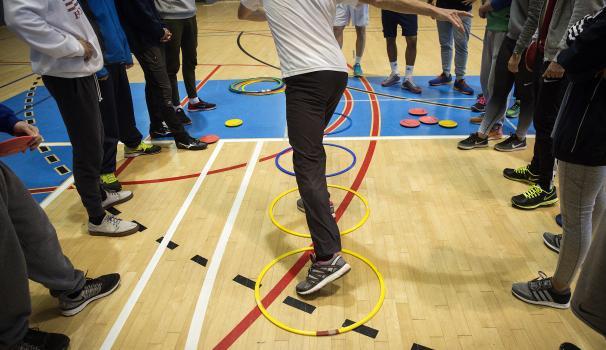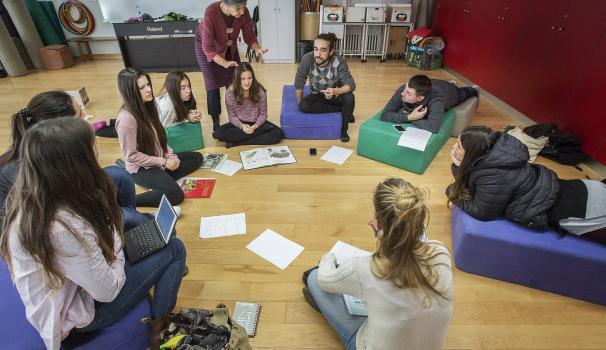Versatile training
Professionalism in physical activity and sports (teaching, physical training, management of sports entities, programming of activities in the natural environment, world of leisure, tourism, etc.).
Enrolment open

8 a.m. to 2 p.m. / 10.30 a.m to 5.30 p.m / 3 p.m. to 9 p.m.
Blanquerna-URL - Carrer del Císter, 34. 08022 Barcelona
Complex Esportiu Hospitalet Nord - Avinguda de Manuel Azaña, 21. 08906 L'Hospitalet de Llobregat, Barcelona
School of Psychology, Education and Sport Science
If you are passionate about sports, this is the degree that will allow you to turn your passion into a profession. These studies will provide you with the necessary skills bases to work in different areas of the sports sector.
The degree in Physical Activity and Sport Sciences provides high-level training. It works both in the theoretical aspects and in the applied aspects, as well as the more physical component.
Professionalism in physical activity and sports (teaching, physical training, management of sports entities, programming of activities in the natural environment, world of leisure, tourism, etc.).
During all the studies, physical exercise is constant (athletics, swimming, water polo, water polo, combat sports, artistic gymnastics, soccer, rugby, basketball, sailing, tennis...).
The Faculty offers the possibility of simultaneously studying the degree in Physiotherapy, the degree in Primary Education and the degree in Sports Management.
Comprehensive training and personalized follow-up.
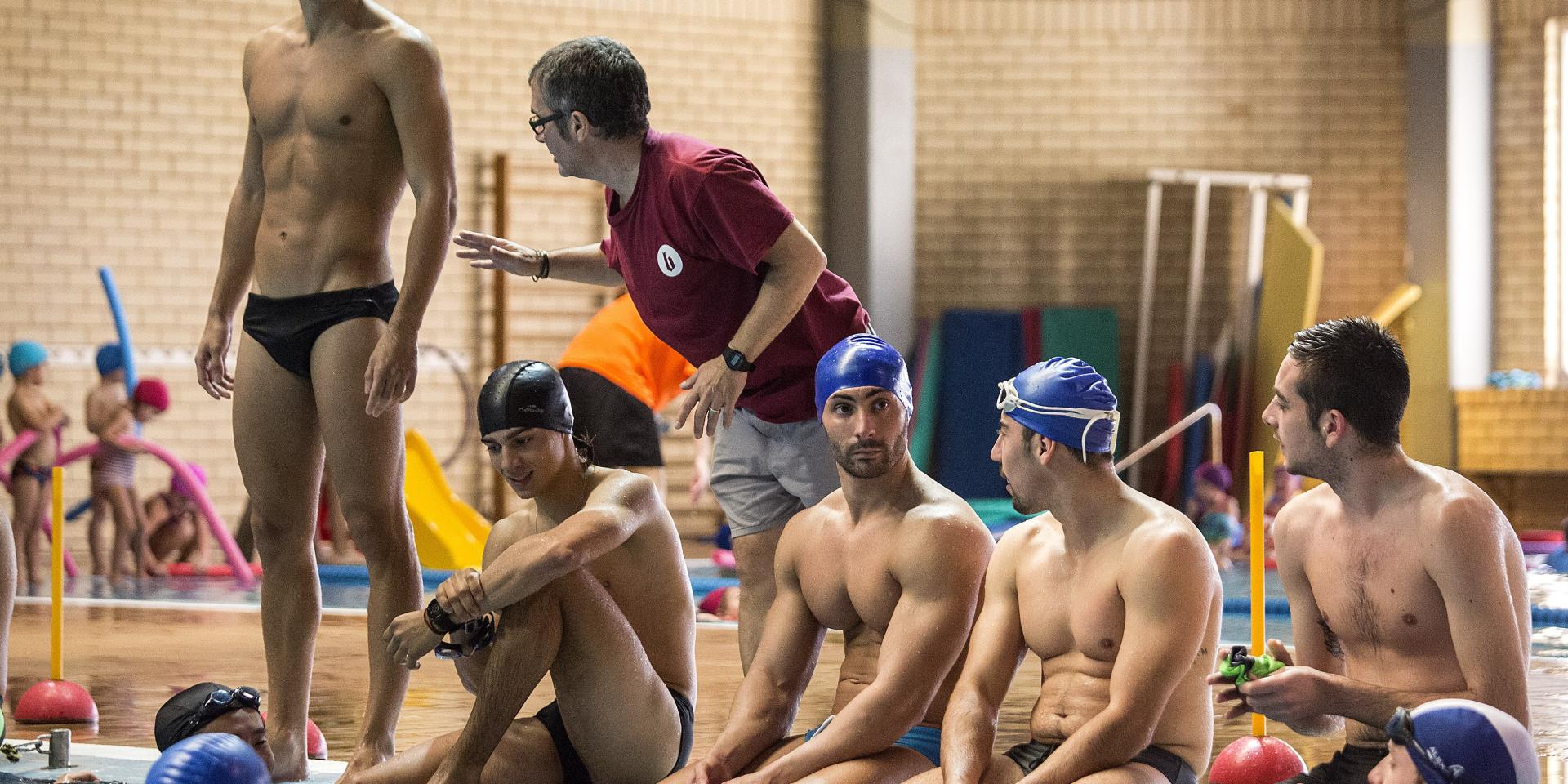
The bachelor's degree in Sport and Exercise Science at Blanquerna trains you to respond to demands in different contexts and areas. The profiles of graduates are in the fields of education, training and health or sports management. During the last year of the degree, students can choose between two majors or specializations:
Intended for people who want to gain in-depth knowledge in the field of health and training. Acquiring the necessary skills to prescribe exercise to healthy people and special groups and to be able to conduct rehabilitation and prevention of sports injuries. Training planning and use of measuring instruments in order to assess physical condition. You will need to follow a specific track of optional subjects during the second cycle of the degree.
Intended for people who want to work in the management of sports organizations (public, private or association), sports equipment and sports projects. Acquiring the necessary competences by way of a specific optional itinerary throughout the second cycle that will enable student's to acquire the necessary competences to work in this field.
different kinds of sports.
of labor insertion.
high-level sports graduates thanks to the tutoring service.
hours of sports practice distributed throughout the bachelor's degree.
The Blanquerna methodology is based on seminars, a core element in achieving personalized and qualitative learning and holistic training that includes not only academic and professional competencies but also personal and human skills.
Seminars with small groups of 10-12 students facilitate interdisciplinary learning, intellectual and professional reflection, and customized learning. The faculty advisor collaborates in students' academic, personal and vocational orientation.
We have agreements with more than one thousand internship centers and a 95% job placement. Internships are carried out in pioneering and innovative organizations, institutions and schools that allow you to vindicate everything you have learned during the degree.
Studying abroad is a life-changing experience. We offer you the opportunity to take part in various exchange programs and international cooperation programs and to do internships abroad. Furthermore, the curriculum includes training to obtain B2 level English certification.
ApS (Learning and Service) is a complex activity that integrates service to the community with learning: one of the main ideas is that our students can learn by accompanying other social institutions and continue to grow in the acquisition of values and critical thinking. These are activities or projects in which learning is linked to performing a real service.
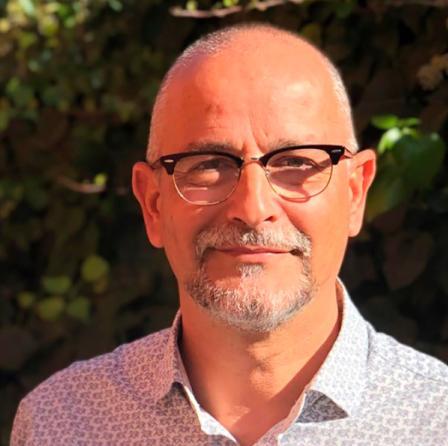
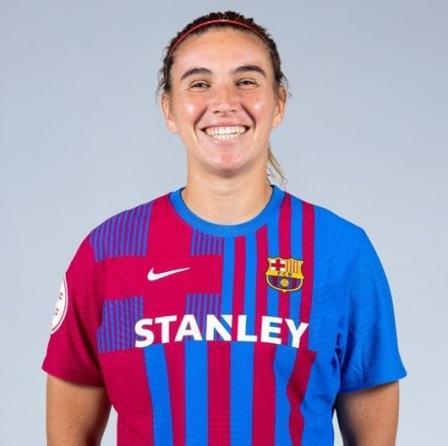
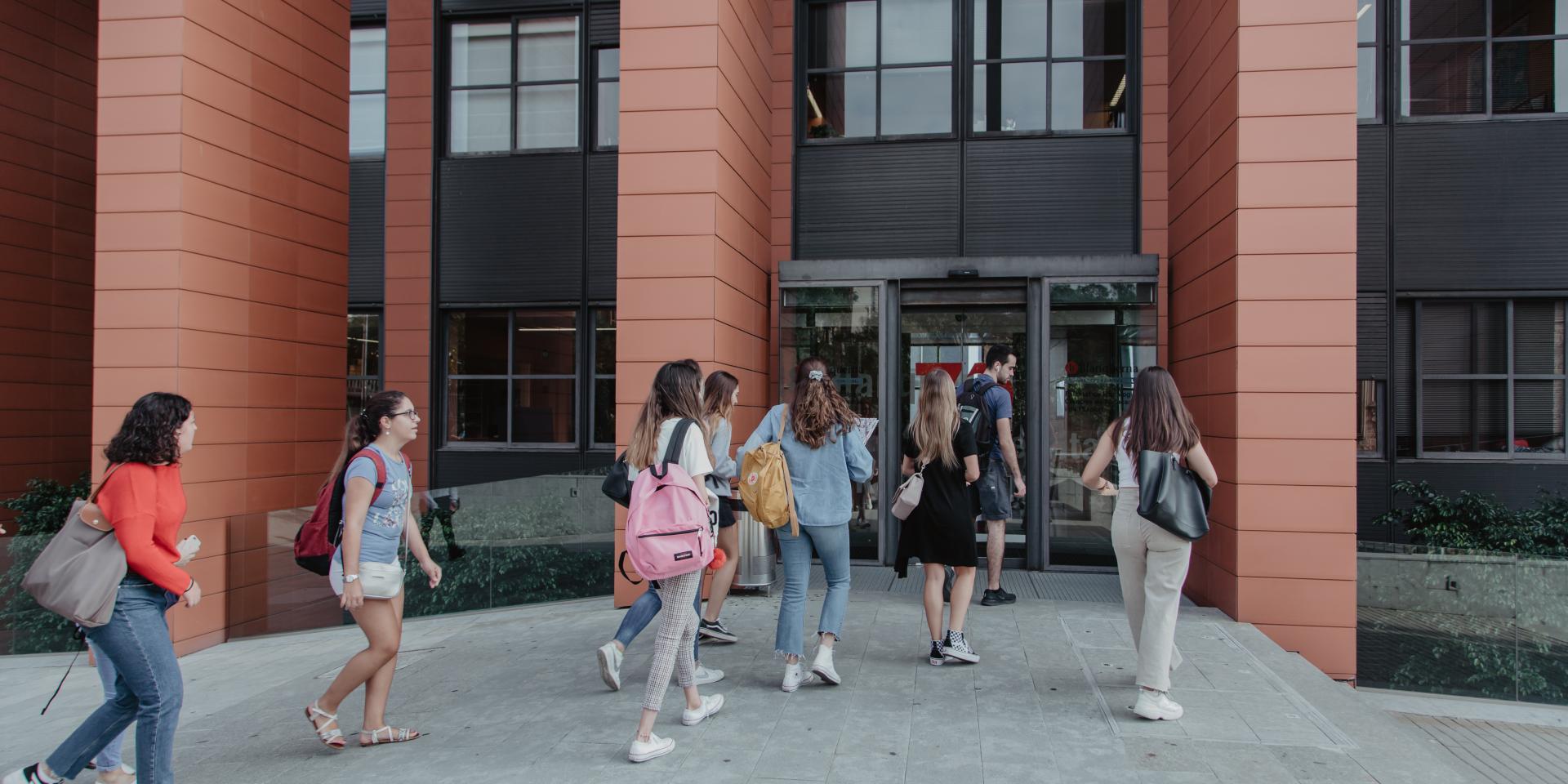
Study for two majors simultaneously, consecutively or following a track tailored to you
News
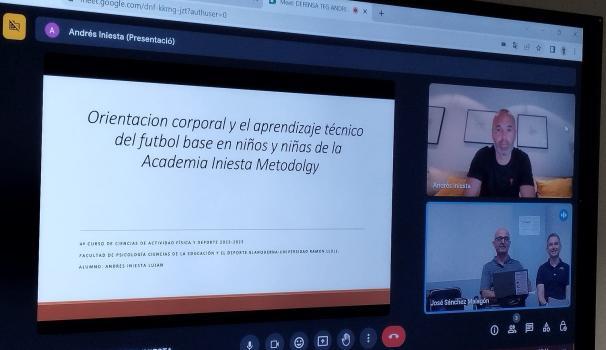
July 26, 2023
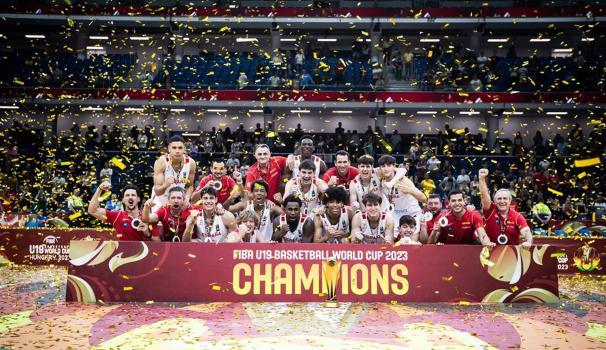
July 20, 2023
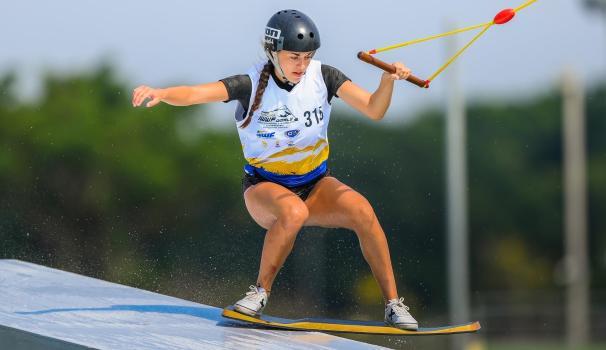
July 20, 2023
The curriculum of the Bachelor's Degree in Physical Activity and Sport Sciences is made up of core subjects, compulsory subjects, electives, practicals and a final thesis structured in two cycles (4 years), from September to May. The first one introduces subjects related to basic sciences, fundamentals of sports, biological bases, sports and humanities. In the second, subjects related to training, motor skills, pedagogical foundations and sports management. From the second cycle onwards, students define their training project based on two specialization tracks, the internships and the final thesis. You can see it in detail below:
| First | Second | Third | Fourth | Total | |||
| Final degree project | 12 | 12 | |||||
| Core curriculum | 30 | 36 | 66 | ||||
| Internships | 6 | 6 | 12 | ||||
| Compulsory | 30 | 24 | 48 | 18 | 120 | ||
| Optional | 6 | 24 | 30 | ||||
| Total | 60 | 60 | 60 | 60 | 240 |
| Subject | Credits | Academic type | |
| Seventh semester | |||
| Management for Physical Activity and Sport: Planning and operation of sports teams | 6 | Compulsory | |
| Management for Physical Activity and Sport: Sports Project Management | 6 | Compulsory | |
| Management for Physical Activity and Sport: Sports organisations and their management | 6 | Compulsory | |
| Seminar VII | 0 | Compulsory | |
| Optional credits (choose one of them) | |||
| Adapted Physical Activity | 6 | Optional | |
| Sport management of risk in unconventional spaces | 6 | Optional | |
| Eighth semester | |||
| Practicum II | 6 | Practicum | |
| Seminar VIII | 0 | Compulsory | |
| Optional credits (choose one of them) | |||
| Sports Performance Training | 6 | Optional | |
| Legal Forms and Creation of Sports Companies | 6 | Optional | |
| Optional credits (choose one of them) | |||
| Functional re-adaptation to physical exercise | 6 | Optional | |
| Sport management and social inclusion | 6 | Optional | |
| Optional credits (choose one of them) | |||
| Control and optimization of training loads | 6 | Optional | |
| Sports Tourism | 6 | Optional | |
| Annual | |||
| Final degree project | 12 | Final degree project | |
| First | Second | Third | Fourth | Total | |||
| Practicum | 3 | 3 | 6 | ||||
| Final degree project | 9 | 9 | |||||
| Core curriculum | 30 | 30 | 60 | ||||
| Compulsory | 30 | 30 | 57 | 6 | 123 | ||
| Optional | 42 | 42 | |||||
| Total | 60 | 60 | 60 | 60 | 240 |
| Subject | |||
| First semester | |||
| Anatomy of the locomotor system | 6 | Core curriculum | |
| History of Sport | 6 | Core curriculum | |
| Individual Sports I: Swimming | 3 | Compulsory | |
| Individual Sports I: Athletics | 3 | Compulsory | |
| Individual Sports II: Rhythmic and Artistic Gymnastics | 3 | Compulsory | |
| Individual Sports II: Combat Sports | 3 | Compulsory | |
| Didáctica de la Iniciación Deportiva | 3 | Compulsory | |
| Second semester | |||
| Kinesiology and Biomechanics | 6 | Core curriculum | |
| Bases of Human Motor Skills | 6 | Core curriculum | |
| Team Sports I: Football | 3 | Compulsory | |
| Team Sports I: Rugby | 3 | Compulsory | |
| Team Sports II: Basketball | 3 | Compulsory | |
| Team Sports II: Handball | 3 | Compulsory | |
| Individual Sports III: Nautical Sports | 3 | Compulsory | |
| Annual | |||
| Seminar of Methodology to Learn at University | 6 | Core curriculum |
| Subject | |||
| Third semester | |||
| Physiology of Physical Activity and Sport | 6 | Core curriculum | |
| Sports psychology | 6 | Core curriculum | |
| Body Expression | 6 | Compulsory | |
| Sport, Leisure and Recreation | 6 | Compulsory | |
| Activities in Nature I | 3 | Compulsory | |
| Seminar of Outdoor Physical and Sport Activities | 3 | Compulsory | |
| Fourth semester | |||
| Nutrition for Physical Activity and Sport | 6 | Core curriculum | |
| Contemporary Thinking | 6 | Core curriculum | |
| Motor Learning and Development | 6 | Core curriculum | |
| Team Sports III: Hockey | 3 | Compulsory | |
| Team Sports III: Volleyball | 3 | Compulsory | |
| Individual Sports III: Tennis | 3 | Compulsory | |
| Seminar of Organization of Sports Events | 3 | Compulsory |
| Subject | |||
| Fifth semester | |||
| Pedagogy of Physical Activity and Sport | 6 | Compulsory | |
| Training for Sport Performance | 6 | Compulsory | |
| Physical activity and health | 6 | Compulsory | |
| Anthropology and Sociology of Sport: Anthropology, Body and Transcendence | 3 | Compulsory | |
| Anthropology and Sociology of Sport: Sociology of Sport | 3 | Compulsory | |
| Sports Organisations and Facilities: Management of Sports Organisations I | 3 | Compulsory | |
| Seminar of Training: Performance and Health | 3 | Compulsory | |
| Sixth semester | |||
| Didactics of Physical Education | 6 | Compulsory | |
| Training Instruments and Tests | 6 | Compulsory | |
| Health Training | 6 | Compulsory | |
| Management of Sports Projects | 6 | Compulsory | |
| Sports Organisations and Facilities: Management of Sports Facilities I | 3 | Compulsory | |
| Practicum I | 3 | Practicum |
| Subject | |||
| Seventh semester | |||
| Seminar of Sport and Social Transformation (Service-Learning) | 3 | Compulsory | |
| Ethics and deontology | 3 | Compulsory | |
| Final Degree Project | 9 | Final degree project | |
| Optionality I (must choose 1) | |||
| Strength Training in Sports | 6 | Optional | |
| Activities in Nature II | 6 | Optional | |
| Optionality II (must choose 1) | |||
| Health Education | 6 | Optional | |
| Financial Management Applied to Sports Organisations | 6 | Optional | |
| Optivity III (must choose 1) | |||
| Scouting and Data Analysis | 6 | Optional | |
| Entrepreneurship in the Sports Sector | 6 | Optional | |
| Optionality IV (must choose 1) | |||
| Integration and Control of Conditional Load in Team Sports | 6 | Optional | |
| Sports Tourism | 6 | Optional | |
| Eighth semester | |||
| Practicum II | 3 | Practicum | |
| Optionality V (must choose 1) | |||
| Functional Rehabilitation in Physical Exercise | 6 | Optional | |
| Sports Management and Social Inclusion | 6 | Optional | |
| Optionality VI (must choose 1) | |||
| Training Planning and Control in Endurance Sports | 6 | Optional | |
| Planning and Organising Sport at School Age | 6 | Optional | |
| Optionality VII (must choose 1) | |||
| Optimisation of Physical Exercise in Children, Adults and Ageing | 3 | Optional | |
| Management of Sports Organisations II | 3 | Optional | |
| Optionality VIII (must choose 1) | |||
| Adapted Physical Activity | 3 | Optional | |
| Management of Sports Facilities II | 3 | Optional |
Course fees are paid in installments without any interest. At the time of enrollment, 50% of the total cost of the credits for which the student is enrolled must be paid*; the remaining 50% is split into nine monthly installments (from October to June) payable by direct debit.
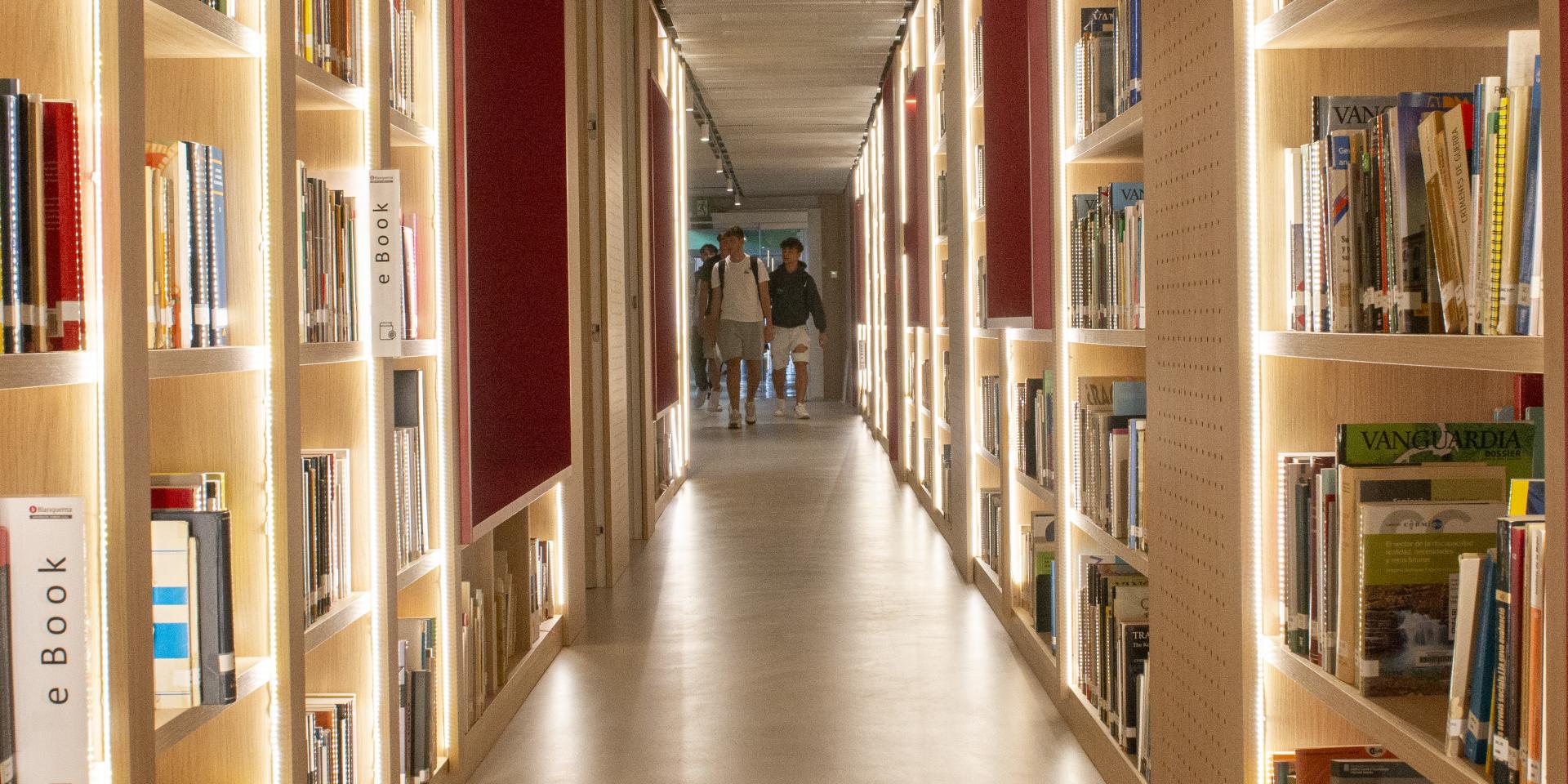
Fundació Blanquerna discounts (not cumulative with each other):
In order to apply the discount, you must prove it with the corresponding document. Students must bring the original document in person to the Academic Secretariat, together with their identification document, for validation and application of the corresponding discount.
The deadline for submitting the supporting documentation for the 2026-2027 academic year is September 30, 2026.
The sports sector is a sector in constant growth that requires professionals who are prepared to work in different areas of activity: training, teaching, management, health and leisure, among others.
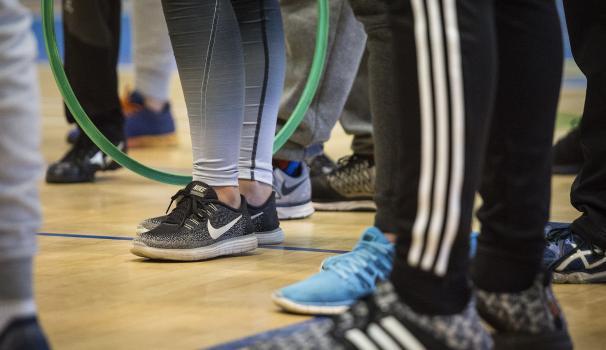
Teaching at schools and vocational training (you must have an official master's degree in Teacher Training - Specialization in Physical Education).

Design and management of sports projects. Creation of sports services and products companies.
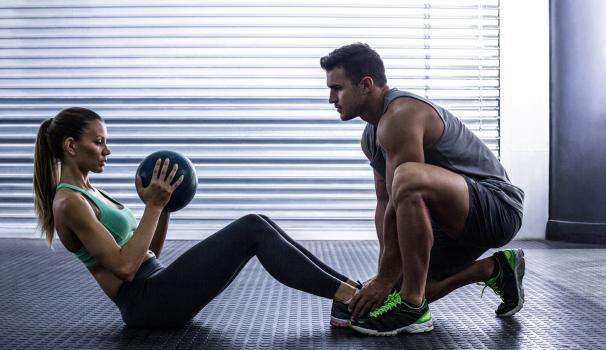
Management and technical coordination of sports competition teams.
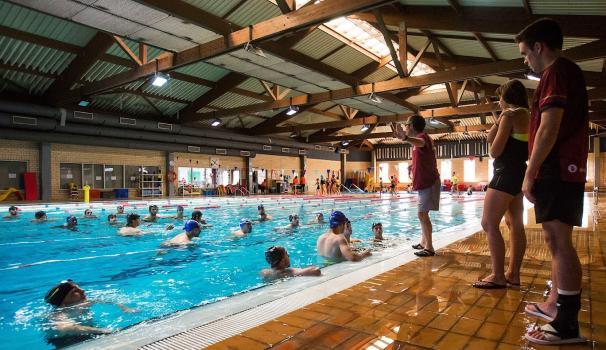
Design of motor rehabilitation programs for athletes in the process of recovery, the elderly, rehabilitation, children and young people in social exclusion and disabled people.
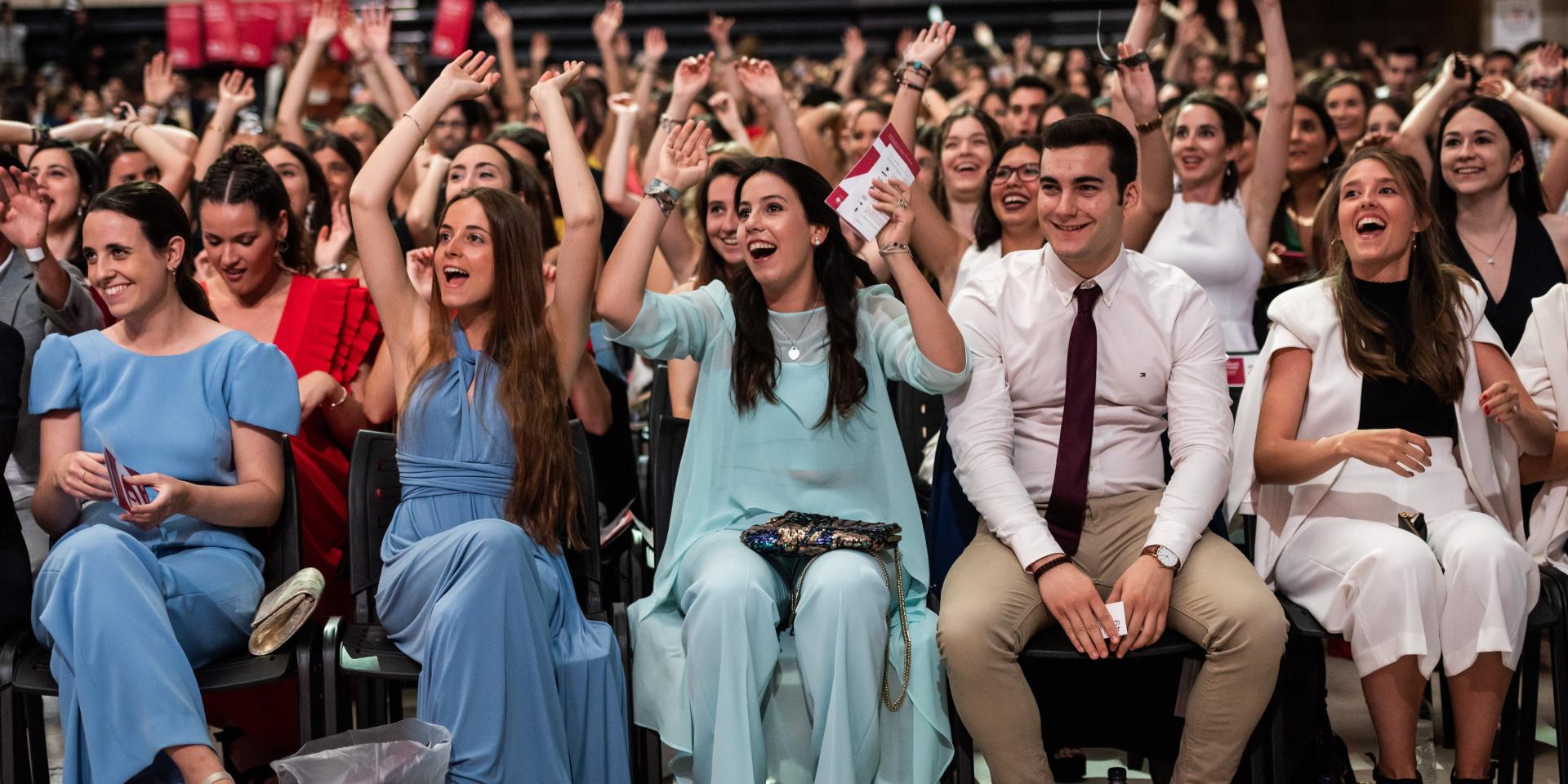
Our work doesn't finish the moment you graduate. The Alumni department will support you to enable us to achieve an employment rate of 90% of students in the first year after graduation
Grup Sintagmia, Club Metropolitan, FC Barcelona, Centre Tecnificació CAR Sant Cugat and CET 10
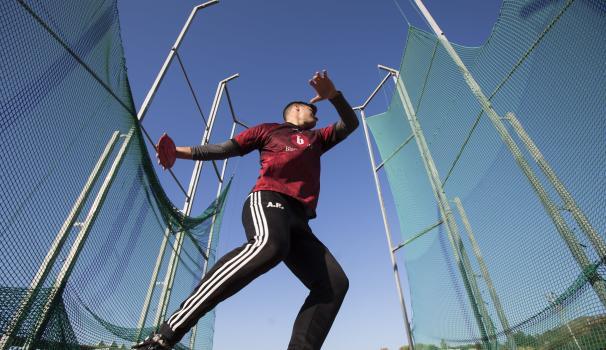
For the bachelor degrees in SES and Sports Management, the School avails of the facilities of the Hospitalet Nord Sports Campus. Practical sports activities are carried out in this space, thanks to the large array of resources and materials available.
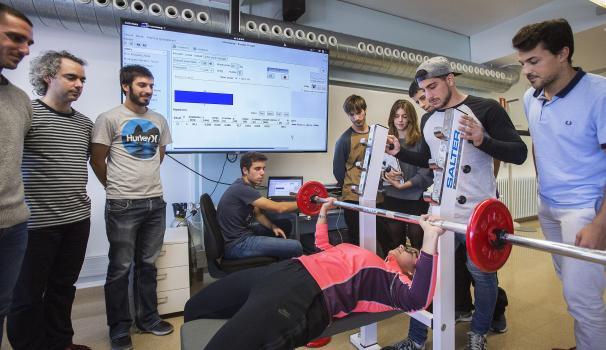
It is a space dedicated to research and teaching that has a wide range of materials to study topics related to the human body and sport.
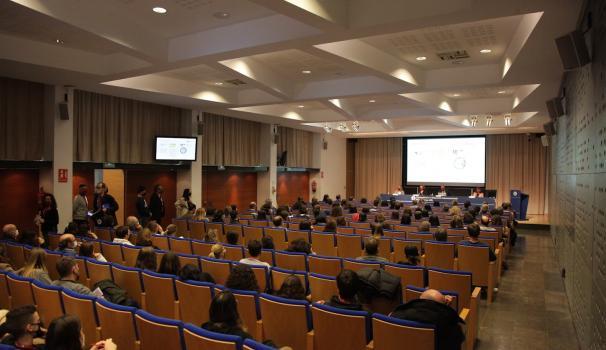
The school has an auditorium that can be used for celebrations, academic events, conferences or activities. In addition to the school's events, the space hosts other occasions that require ample space.
If you are part of a research group, a professor or a PhD student and you need help with a project, you can ask for advice. This assistance includes analysis, guidance, help with applying for awards, and the financial management of projects.
Do you want to improve your level of Catalan? Have you just arrived in Catalonia and don't know what to do? Are you studying English and want to reinforce your language skills? Learn at your own pace with the Language Service.
Here you will find the resources and professionals to help you achieve your goals.
If you need a quiet space to study or to do individual and group work, come to the library! Each school has its own library with computers, workrooms, reading points and an extensive catalog of documents you can consult in both hard copy and digital format.
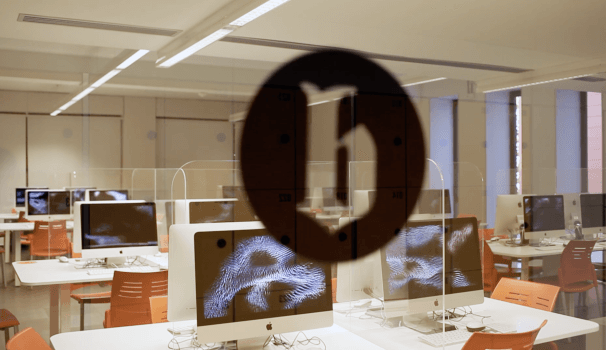
If you have a job or just need a computer, you can go to the computer classrooms or workspaces and use the Macs we have at your disposal.
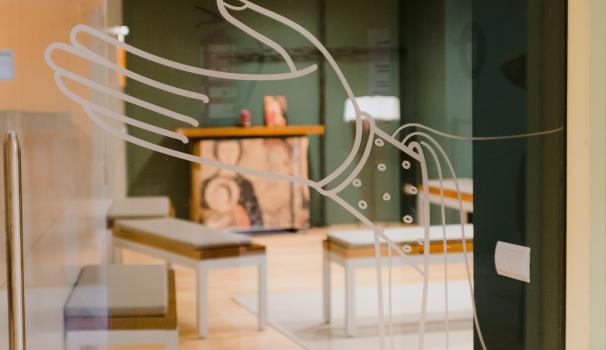
The chapel is the right place to find recollection, peace, to focus, to pray and to celebrate the Eucharist weekly and at important liturgical moments (Christmas, Ash Wednesday and Easter). The sacrament of reconciliation is also celebrated.
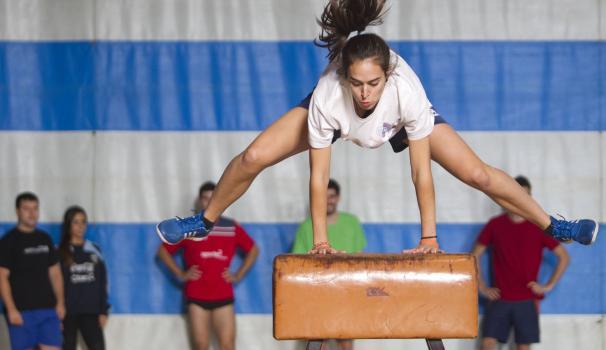
At Blanquerna we facilitate the incorporation and monitoring of the academic pace of all those people who are High Level athletes based on tutorials and personalized attention to study each case.
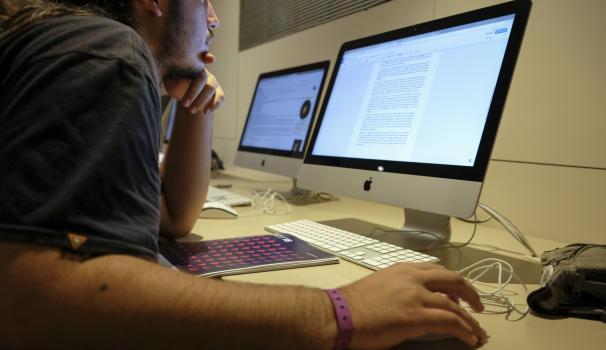
The SOPTIC (Pedagogical Guidance Service on Information and Communication Technologies) offers support in the use of ICT to both teachers and other faculty services.

Do you need guidance or support on your research project? The Methodological Advisory Service (SAM) offers you a series of procedures to guide you in your work process in the field of research.
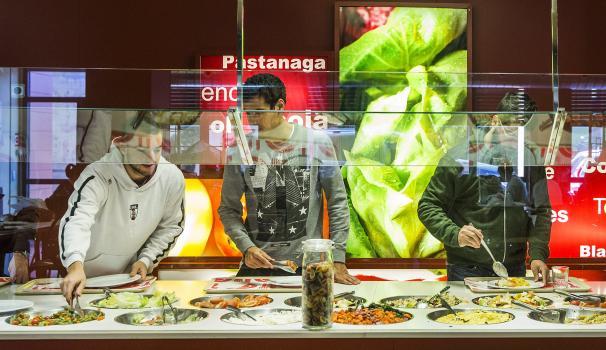
The nerve center of the quintessential faculties is the bar. There, teachers, students and staff meet throughout the day for breaks or meals.
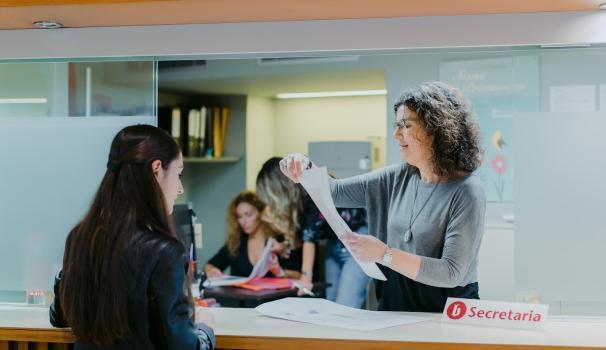
The Academic Secretaries of the Blanquerna faculties are the space for students to relate to the processes linked to the registration of official and own courses.

Would you like to receive information on pre-registration and admissions processes, scholarships and grants or validations? The SIOE is the service you need. Ask for all the information about any of these processes and discover all the possibilities at your fingertips.
Professional experience is a core part of our methodology. For this reason, we have a broad spectrum of internship agreements to meet the needs and preferences of all students. You will graduate having worked in your industry.
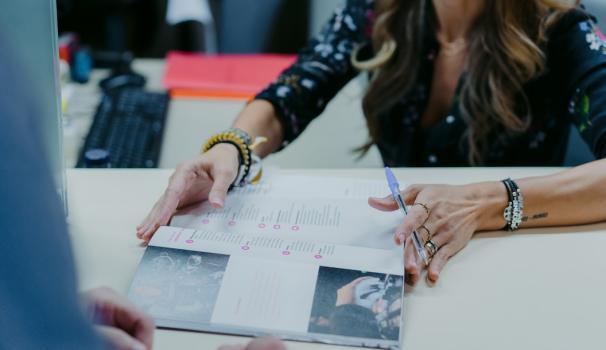
At Blanquerna, we put the future within everyone's reach thanks to our scholarships and grant service to start or continue studying at our schools. Financial aid is both internal and external to the university. You will find a wide range of possibilities.
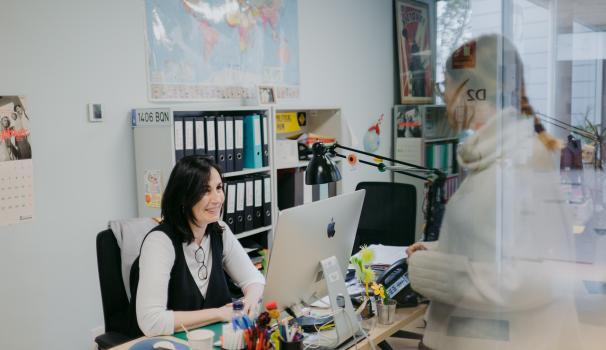
Going abroad is a unique opportunity to discover the plurality of the world. Aware of the importance of the internationalization of studies, we have established mobility agreements around the world.
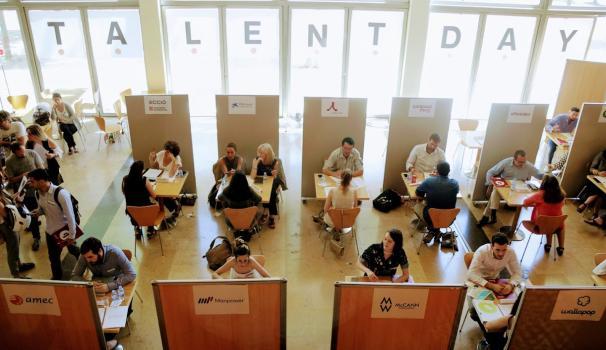
This service provides graduates with the necessary means so that they can actively participate in their professionalism and propose optimal candidates to organizations and companies looking for staff.

The leap into the world of work is always a challenge. For this reason, we provide a Job Bank for students and graduates. This service puts students in touch with companies and institutions looking for staff.
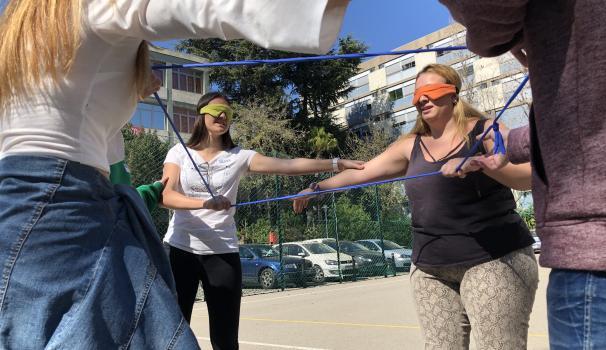
Solidarity and the struggle for human dignity are values that identify us. Solidarity Action is a volunteer program that our students can join to participate in projects in the Third and Fourth World.
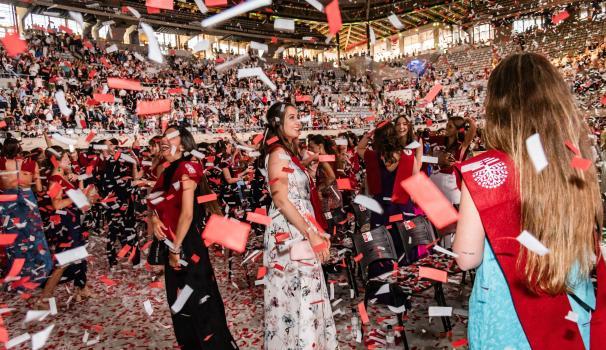
Studying in Blanquerna allows you to be part of our community. Being a college student opens the door to a lot of options for continuing your vocational training beyond your time in the classroom.
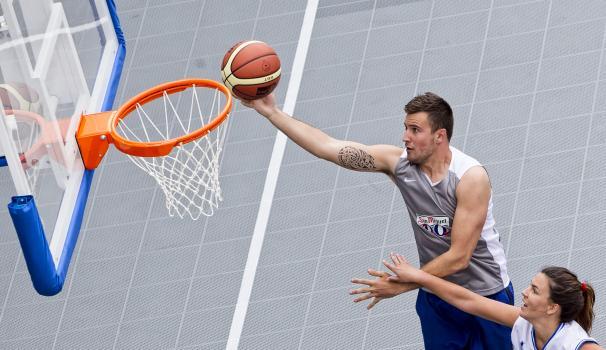
Want to represent the URL in college sports tournaments? You can find a wide range of possibilities for both individual and team sports. To be a student of Blanquerna, you will have a discount at the Can Caralleu and La Salle Sport & Fitness sports complexes.
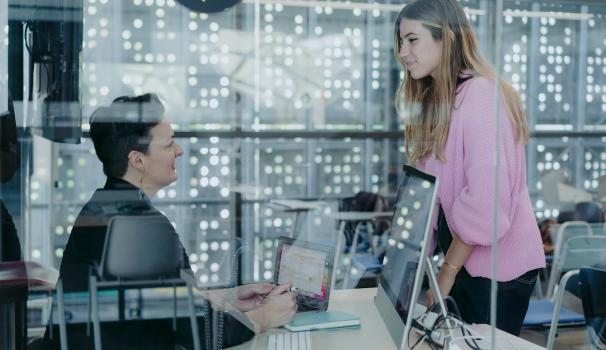
If you are in a difficult situation in the academic, personal or social field, you can request, free of charge, the personalized attention of the SOP. This is an interdisciplinary team of professionals who will guide you in dealing with the situation.
In the three Blanquerna faculties, you will find spaces for reflection isolated from the hustle and bustle dedicated to the celebration of the Faith or cultural and religious animation. If you wish, you can also receive personalized attention and information about church life.
At Blanquerna we promote personal development at all levels to people with a diversity of specific needs from a normalizing context that encourages personal autonomy and uniqueness.
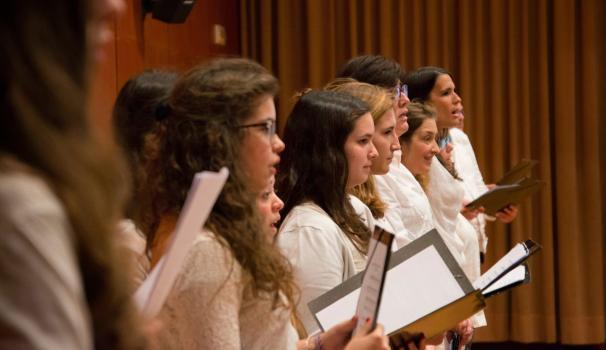
If you like music and want to take part in the concerts of institutional events and festivities, sign up for the Blanquerna Choir. There you will meet new friends and enjoy music.
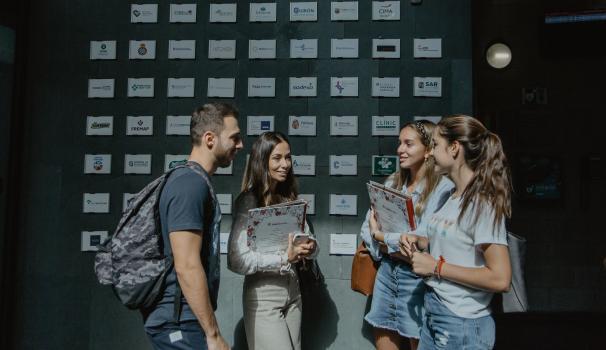
Each class group must elect a representative to put forward concerns or make proposals to the faculty members and academic management. At the same time, each degree must appoint a delegate and each school a representative on the general URL council.
Contact between students and the university is constant and is channeled through the Student Council, the body that collects proposals and requests from students and facilitates university life.

Are you studying a foreign language and want to improve your level? Do it at your own pace in the language self-learning classroom. This service offers various teaching resources and materials to practice the language.

We’re here to listen! Have you experienced or witnessed any situation of harassment? Do you have any questions about Blanquerna’s equality policy? Would you like to make a proposal or suggestion regarding gender issues? Use this Anti-harassment Point: write to us through the channels you’ll find at the bottom of this page.
Josep Solà Santesmases
Jordi Arboix Alio
Josep Cabedo Sanromà
Marta Santiago Carres
Sixte Abadia Naudí
Joan Aguilera Castells
Oriol Barrero Borras
Jorge Barres Costa
Marina Bernardo Flórez
Bernat Buscà Safont Tria
Rafael Cabanillas Quintanilla
Cristina Cabrejas Mata
Xavi Camino Vallhonrat
Josep Campos Rius
Montserrat Canals Ventura
Pol Cejas Borras
Sergi Cerezo Esteve
Ramon Company Romero
Lluís Cumellas Ruíz
Francesc Xavier De Blas Foix
Alfonso De Diego Caballero
Kelly Priscila dos Santos Ferri
Manel Font Farre
Azahara Fort Van-Meerhaeghe
Jesús Fortuño Godes
Laura Garcia Lopez
Maria Giné Garriga
Miriam Elisa Guerra Balic
Cristina Günther Bel
Marc Llinàs Folch
Juan Carlos Magaña Gallardo
Sónia Martínez Solà
Jordi Mascarell Panareda
Francisco Javier Medina Luque
Ana Isabel Merayo Garcia
Adria Miro Alba
Josep Monsech Sala
Marta Moragas Rovira
Sacra Morejón Torné
Daniel Moreno Galceran
Àngel Jesús Navarro Guareño
Ainhoa Nieto Guisado
José Maria Olave Lumbreras
Meritxell Pacheco Pérez
Anna Pagès Santacana
Andrea Perez Rivasés
Susana Pérez Testor
Daniel Picó Benet
Xavier Prat Ribé
Asunción Puche Echegaray
Xavier Pujadas Martí
Montse Pujol Marzo
Laura Rafols Parellada
Maria Ramoneda Rabat
M Dolors Ribalta Alcalde
Verònica Riera Batalla
Joan Josep Rodríguez Yañez
Blanca Roman Viñas
José Sánchez Malagón
Xavier Sant Vilella
Enric Maria Sebastiani Obrador
Josep Maria Simon i Rollan
Scott Stephen Sleigh
Jose Luis Socorro Cumplido
Josep Solà Niubó
Monica Solana Tramunt
Maite Terre Pascuet
Francesc Torralba Roselló
Guillemtt Trabal Taña
Victor Tremps Dominguez
Guillem Turro Ortega
David Ubach De Fuentes
Joan Valls Navarro
Jordi Viñas Fort
Carlos Zurita Mon
The application process for a place in the 2026-2027 academic year is now open and consists of three phases:
The application for a place can be made online or in person and entitles the applicant to participate in the admission process.
It can be done via the Application for admission button on the page for each degree, or directly from here, and requires:
It can be done at the School itself, by going to the Student Information and Guidance Service (SIOE), and the following must be submitted:
IMPORTANT - BACHELOR'S DEGREE IN PSYCHOLOGY AND BACHELOR'S DEGREE IN NURSING: Students from High School (Batxillerat):
If, at the time of submitting the application for a place in the degrees in Psychology or Nursing, as well as for simultaneous studies in either of these two degrees (e. g., Psychology and Speech and Language Therapy, or Nursing and Nutrition), the final High School and PAU (University Entrance Exams) grades are already available and are equal to or higher than 7, the applicant will be called to enroll once admitted.
If the final entrance grades for High School and PAU (University Entrance Exams) are not available, an official certificate from the educational center must be attached, containing the average grade for the first year or the final High School grade. Once this certificate is submitted, there are two options:
Option 1. If the grade is equal to or higher than 7, the student will be called to make a conditional enrollment and may choose a shift while places are available.
Option 2. If the grade is lower than 7, the student may participate in the June place allocation, which will be based on the submitted grade as the first criterion and the date of payment of the place application as the second criterion. From the date on which the final grade of the university entrance exams becomes available, if there are still places available, only students who have submitted the certificate with their final admission grade will take part in the allocation process.
Note: In the case of students from international high schools, an official document from the school of origin must be submitted with the final average grade for the course and its equivalence to the Spanish system.
IMPORTANT - BACHELOR'S DEGREE IN PSYCHOLOGY AND BACHELOR'S DEGREE IN NURSING: Students from Higher-Level Vocational Training (CFGS):
If, at the time of submitting the application for a place in the degrees in Psychology or Nursing, as well as for simultaneous studies in either of these two degrees (e. g., Psychology and Speech and Language Therapy, or Nursing and Nutrition), the final CFGS grade is already available and is equal to or higher than 8, the applicant will be called to enroll once admitted.
If the entrance grade (neither provisional nor final) for CFGS is not available, applications for a place in the aforementioned studies can be formalized, and the student will participate in the June place allocation, which will be based on the final grade submitted via an official certificate from the educational center containing the final average grade of the qualification. The grade mentioned will be considered as the first criterion, and the date of payment of the place application as the second criterion. For the Bachelor's Degree in Psychology, 10% of places will be reserved for students from this pathway. For the Bachelor's Degree in Nursing, 30% of places will be reserved for students from this pathway.
IMPORTANT – DEGREE IN PSYCHOLOGY AND DEGREE IN NURSING: Students coming from previously started university studies:
If, at the time of applying for a place in the Psychology or Nursing degree programs, as well as for any double degree involving either of these programs (e.g., Psychology and Speech Therapy or Nursing and Nutrition), the applicant has already begun university studies, they must contact the Faculty’s Student Information and Guidance Service.
Approximately within two working days after the place application, the student will be informed by email about their admission. If admitted, the same message will invite them to formalize enrollment, including instructions on when and how to complete the procedure.
The criterion used to call admitted students to formalize enrollment will be the order of payment of the place application. For degrees with more than one shift, note that a shift may fill up during the enrollment period. The place will be definitive once the student has submitted the documentation with the final university entrance information and the first enrollment payment has been made.
For degrees taught in English, students must demonstrate a minimum B2 level of English to be admitted. The level can be accredited through the level test that all degree students must take before starting their program. To prove the minimum level, an official language certificate of B2 or higher can also be submitted: IELTS (6-7), TOEFL (IBT 90-110), CAMBRIDGE, or Official Language Schools, obtained within the last two years. Certificates from other organizations will not be accepted. The certificate does not exempt students from taking the level test to determine the English level for the first year.
It is the student's responsibility to have a level equivalent to B2 in the language of instruction of the degree to properly follow classes
The student called to enroll may choose between two options, depending on whether they already have the definitive entrance pathway or not.
Enrollment in the degree can be formalized before passing the PAU (University Entrance Exams) or CFGS or having the entrance pathway. Enrollment will be conditional on the presentation of the corresponding admission pathway. This option secures the place and allows choosing the shift, in the case of degrees with more than one shift, while places are available.
If the student does not obtain the entrance pathway, the enrollment fee will be refunded, but they will lose the place, preference in shift selection, and the amount paid for the place application (€50). If places remain available in July, they may choose to stay on the waiting list until September, and the money will be held, but they will no longer have preference for shift selection. If they do not obtain the entrance pathway by September, the enrollment fee paid will be refunded.
It will be formalized if, at the time of processing the enrollment, the student already has the university entrance pathway. They may opt for the available places and shifts.
IMPORTANT: Degrees with more than one shift may exhaust places in a specific schedule with conditional enrollment. The required documentation must be uploaded via the Document Repository.
The place will be definitive once the student has submitted the documentation with the final university entrance information and the first enrollment payment has been made.
NOTE: Students in the Communication Degrees must take an English level test that will not be exclusionary for admission but will determine the level at which they start the first year. Each student will be informed of the test date and time by email.
Studies can be paid upfront and/or in interest-free installments. If payment by installment is selected, upon enrollment the student will have two business days to pay 50% of the total cost of the enrolled credits, using their chosen form of payment; this payment will not be taken by direct debit. The remaining 50% will be divided into nine monthly payments from October to June via bank direct debit from the account provided at the time of enrollment. Prices for each academic year are updated annually.
Once payment is made, the corresponding receipt of enrollment can be viewed in the student's Document Repository and via the student's portal.
For the foreign student admission process, the following considerations and requirements must be taken into account in accordance with the prevailing regulations.
Students must apply to the Universidad Nacional de Educación a Distancia (UNED) to obtain the credential certifying that they meet the requirements to access university studies within the state education system (UNED Credential). Therefore, they do not need to take the PAU (University Entrance Exams), but without the mentioned credential, they cannot enroll in our degrees.
The education systems that can be accessed through this pathway are: Germany, Andorra, Austria, European Schools (European baccalaureate), International Baccalaureate, Belgium, Bulgaria, Croatia, Denmark, Slovakia, Slovenia, Estonia, Finland, France, Greece, Hungary, Ireland, Iceland, Italy, Latvia, Liechtenstein, Lithuania, Luxembourg, Malta, Norway, the Netherlands, Poland, Portugal, the United Kingdom, the Czech Republic, Romania, Sweden, Switzerland, China and Cyprus.
These students may access our degrees by submitting the homologation of the High School diploma from the Spanish Ministry of Education or from the autonomous communities with transferred competence, such as the Generalitat de Catalunya. Proof of application for convalidation will be sufficient for students to enroll and begin taking a bachelor's degree course, however full enrollment is conditional on convalidation being confirmed. Bear in mind that convalidating studies can take more than three months to complete, so this process should be done in parallel with the admissions process to our bachelor's degrees. If the convalidation resolution is not obtained in the terms requested by the interested party, the results of any exams taken, or the enrollment made as a result thereof, are rendered null and void.
For any questions or inquiries about the place application or enrollment process, contact [email protected]
The objective of the bachelor's thesis is to evaluate the assimilation of the core skills acquired during the bachelor's degree. Essentially, it consists of writing a research project or designing an intervention program that allows the student to prove they have assimilated the degree's competences.
To write the thesis, the student can decide to do a research project or design an intervention program, and the subjects may be related to any of the areas of the profession or make reference to it.
The work will be conducted individually. Projects must be written in Catalan, Spanish, or English. In any case, the work will have to include a summary in English, Catalan, and Spanish.
The bachelor's degree thesis will last two semesters and will be supervised by a professor-advisor, both individually and through Seminar sessions.
Thus, there will be a space of two hours per week in which the teacher-advisor will hold group seminar sessions in order to share the process being conducted (set guidelines and organize the activity, choose the topic, provide documentation, plan the activities, etc.). These Seminar sessions will be alternated with individualized follow-up/tutoring (in which each advisor will personally follow up on the thesis).
The evaluation will consist of four different elements:
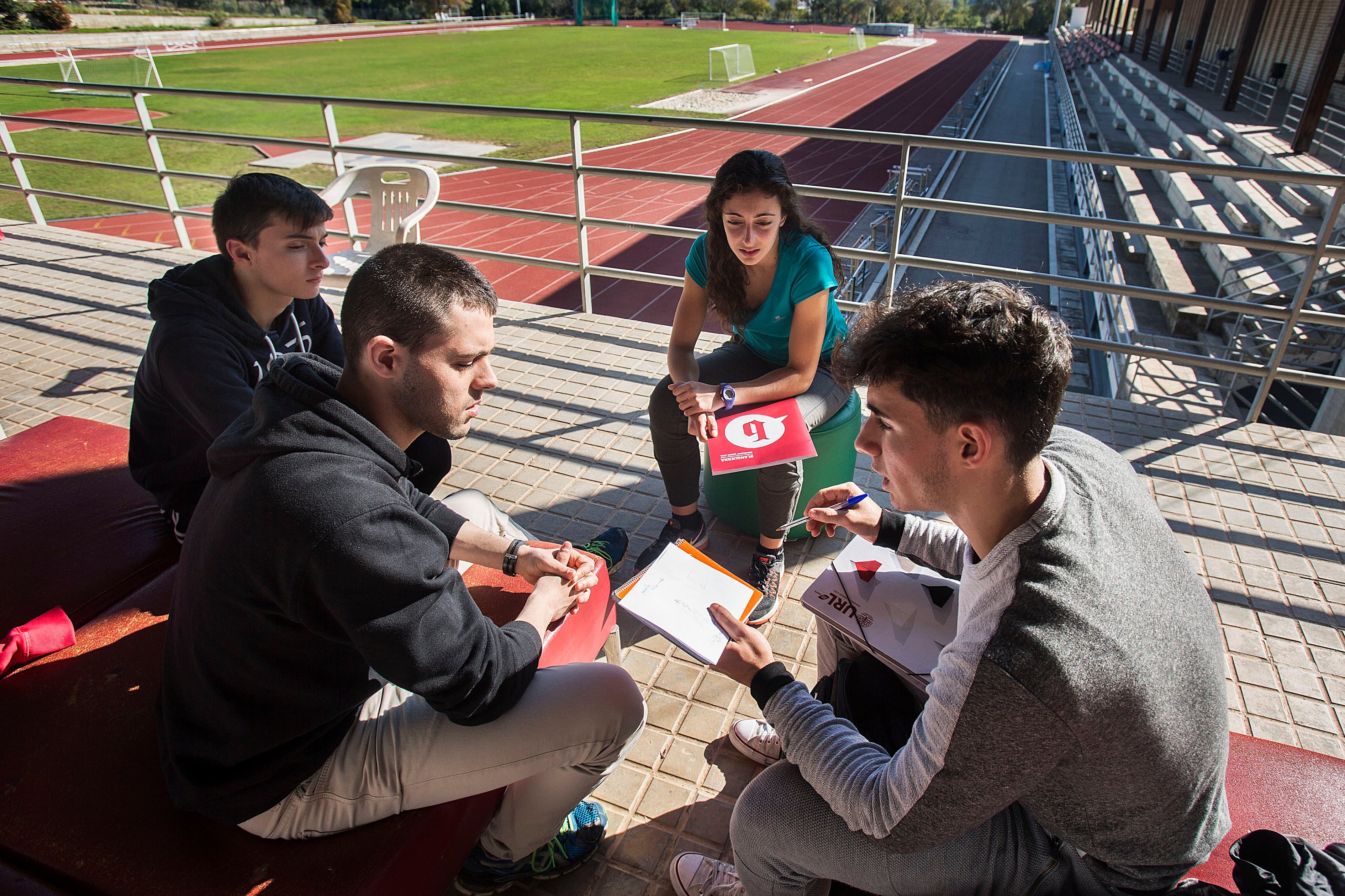
Find the help that best suits your needs between Blanquerna scholarships and grants, public and private grants or funding grants.
Blanquerna-URL is waiting for you!
Les beques a l'excel·lència esportiva de la Facultat de Psicologia, Ciències de l'Educació i l'Esport suposen la gratuïtat del 80% de l'import dels drets d'inscripció i d'ensenyament durant un curs per a titulacions oficials i, en cas de mantenir-se l'excel·lència acadèmica, s'estenen als cursos successius i fins a la finalització de la titulació que l'estudiant estigui cursant.
At Blanquerna-URL, we emphasize the importance of internships at external centers. That is why we have agreements with more than a thousand organizations and entities where you can apply your theoretical knowledge to the professional world and start focusing on your professional future based on the reality of the sector.
We have an excellent network of contacts with agents of the sports industry (sports services and products companies, consultancies, clubs, federations and schools, etc.) that brings students closer to the career reality and facilitates their labor insertion in the sector. Below are some of the places where you can do the internship:
Degree follow-up reports
Other reports
As the European Union points out, gender equality is not only a matter of social justice but also affects the results of teaching and research. Promoting gender equality in research and innovation is one of the European Commission's commitments, and it supports the explicit integration of a gender perspective in Horizon 2020 projects. However, this recommendation is often poorly understood and misapplied. Various documents are presented here with a view to contributing to a better understanding and application of the gender perspective in teaching and research.
RELATED PROGRAMS
We equip you for change





